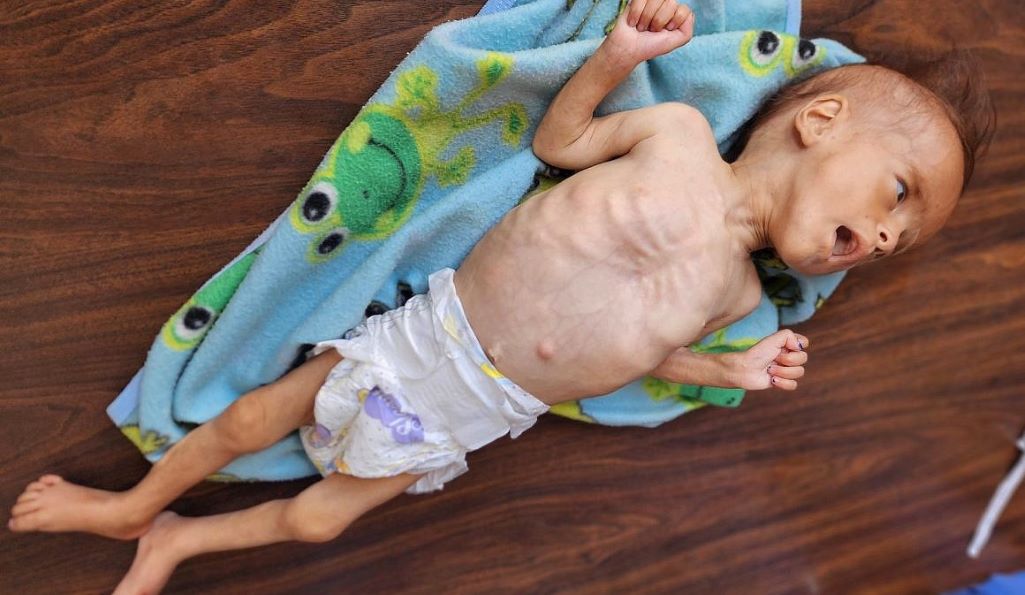Washington, DC., 26 August 2025 ——
A famine is sweeping across Gaza, driven by a confluence of relentless conflict, economic blockade, and systemic aid restrictions. The result: mass hunger, widespread disease, and a population on the brink of collapse. But Gaza’s famine is a man-made catastrophe that could be solved by the simple decision to let aid in and an immediate and unconditional ceasefire.
Impact on Gaza’s Population
On 22 August, after the Integrated Food Security Phase Classification (IPC) released its most recent findings, the UN determined that Gaza is experiencing a full-blown famine. The IPC found that more than 500,000 people currently face starvation, with projections rising to approximately 640,000 by September. UNICEF and the World Food Programme (WFP) warned that at least 470,000 Gazans face catastrophic hunger (IPC Phase 5), while tens of thousands of children and mothers experience acute malnutrition. Maternal and child malnutrition rates are skyrocketing, with fatality figures rising.
More than 80% of the population is now food insecure. Children are particularly at risk, with thousands suffering from acute malnutrition and stunting. Hospitals, overwhelmed and undersupplied, are unable to treat even basic cases of dehydration and infection. The lack of clean water and sanitation is fueling the spread of cholera and other preventable diseases.
Alongside physical deprivation, psychological suffering is widespread. Entire families have been displaced multiple times, living in overcrowded shelters or open areas without adequate protection. The trauma of constant bombardment, hunger, and the loss of loved ones has left deep scars on a generation that has known little else but war.
Continuous airstrikes, ground incursions, and the destruction of critical infrastructure, including water facilities, hospitals, and food supply chains, have rendered the region virtually uninhabitable. Gaza’s agricultural sector, already constrained by restrictions on water and fertilizer imports, has been decimated. Fields lie fallow, irrigation systems are destroyed, and farmers face constant danger in border areas. Further, UN agencies report a near-total collapse of agrifood systems, 70-75% of cropland destroyed, and nearly 95% of livestock lost. Additionally, commercial activity has ground to a halt. Markets once filled with basic goods are now empty, and food prices have soared far beyond what most families can afford.
Humanitarian organizations report severe restrictions on aid convoys and fuel supplies. Despite international appeals, convoys are frequently delayed, diverted, or denied access altogether. When aid does enter, it is insufficient and often fails to reach the most vulnerable. The UN and international NGOs have described the situation as “man-made starvation.”
Violation of Humanitarian Law and International Inaction
Starvation as a weapon is a grave violation of International Law. Additional Protocol I to the Geneva Conventions and the Rome Statute explicitly prohibit the use of starvation of civilians as a method of warfare. Israel’s blockade, the denial of essential supplies, the destruction of infrastructure, and militarized aid schemes are deliberate methods to starve Gaza’s civilian population. The policy is characterized as collective punishment and possibly genocide, as civilians bear repercussions for actions they did not commit.
Despite widespread condemnation and urgent calls for a ceasefire and unrestricted humanitarian access, diplomatic efforts have yielded limited results. Some governments have pledged aid, but logistical and political barriers remain. The UN has warned that without immediate intervention, the famine will become irreversible.
Many observers argue that international law is being blatantly violated, pointing to the deliberate targeting of civilian infrastructure and the use of starvation as a weapon of war. Yet, global powers remain divided, with vetoes in the UN Security Council stalling collective action.
The International Criminal Court (ICC) issued arrest warrants for Israeli leaders Benjamin Netanyahu and then-defense minister Yoav Gallant, on grounds of war crimes, specifically starvation as a weapon of war.
The International Court of Justice (ICJ) ordered Israel to allow unhindered humanitarian aid and to ensure essential services are provided to Gaza’s civilian population, under the Geneva Convention. Evidence shows Israel has not complied.
More than 200 EU diplomats have urged sanctions, arms embargoes, trade suspensions, and business penalties tied to settlements, calling Israel’s conduct a clear violation of human rights. The UN and NGOs, including the European Commission’s ECHO, demand full, unimpeded access for aid agencies and immediate ceasefire measures.
TGR has called for targeted sanctions and suspension of arms transfers against Israel, as well as cooperation with the ICC. Robust global action is critical. Without assertive policy response: sanctions, arms embargoes, and unwavering humanitarian convoys, the system risks failure and mass civilian deaths.
The famine in Gaza is not a natural disaster. It is a crisis born of war, politics, and neglect. It’s a preventable, man-made atrocity that demands immediate global action. It stands as a stark reminder of the devastating human cost of conflict and the failure of the international community to support the basic rights of civilians. Upholding international humanitarian law is not optional. It is imperative. States must act decisively to ensure accountability, support life-saving assistance, and restore humanity in Gaza. Without immediate, coordinated global action, the world is a witness to genocide.
Photo credit: Eight-month-old Salam Wadi at an UNRWA clinic in Gaza City, 9 July 2025. (Hussein Owda/UNRWA).
Lara Kajs is the Founder and Executive Director of The Genocide Report (TGR). She has conducted extensive fieldwork in conflict and displacement settings, including Yemen, Syria, and Afghanistan. Her work focuses on humanitarian crises, international humanitarian and international law, and atrocity prevention.

